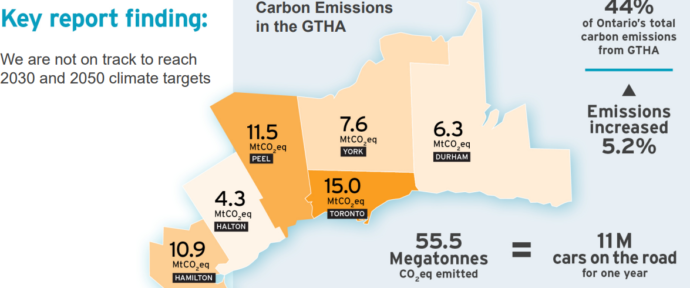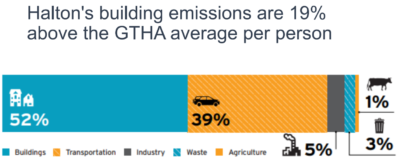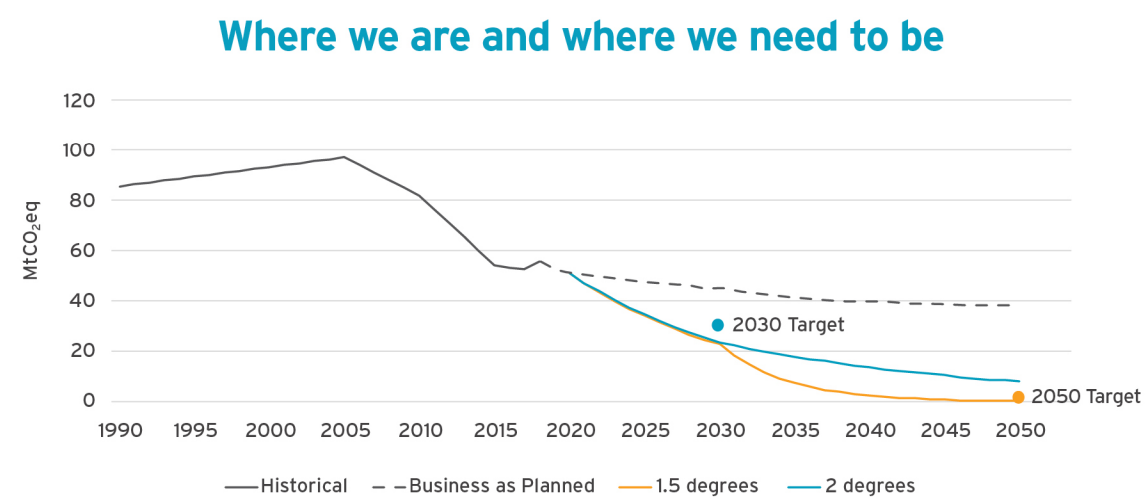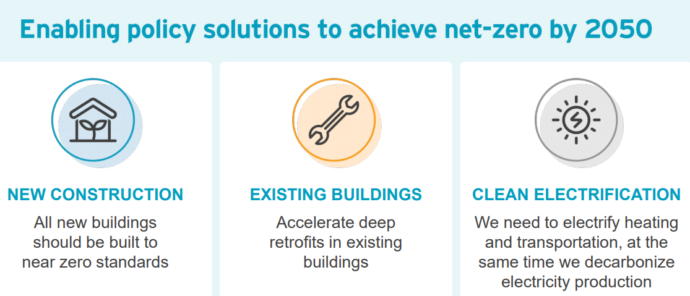 By Pepper Parr
By Pepper Parr
March 29th, 2021
BURLINGTON, ON
City Council heard a report that was not good news from a climate perspective.
Bryan Purcell, a TAF (The Atmospheric Fund) VP, told council in a virtual delegation that “total carbon emissions in the GTHA increased 5.2% in 2018, reaching 55.5 Mt.
 The report is a stark reality check, showing that since the completion of the coal phase out, emissions are slowly increasing across all regions and nearly all sources.
The report is a stark reality check, showing that since the completion of the coal phase out, emissions are slowly increasing across all regions and nearly all sources.
The per capita natural gas emissions are increasing even when adjusted for population growth and weather.
TAF (The Atmospheric Fund) is a regional climate agency that invests in low-carbon solutions for the Greater Toronto and Hamilton Area and helps scale them up for broad implementation. They are experienced leaders and collaborate with stakeholders in the private, public and non-profit sectors who have ideas and opportunities for reducing carbon emissions. We advance the most promising concepts by investing, providing grants, influencing policies and running programs.

The source of the emissions – lowering them is the challenge – which we have not been meeting.
They are particularly interested in ideas that offer benefits beyond carbon reduction such as improving people’s health, creating new green jobs, boosting urban resiliency, and contributing to a fair society.
In the delegation some disturbing information was put before members of Council.
Unfortunately, not one member of Council asked Purcell any questions. Mayor Meed Ward did note that the day was the first anniversary of the Declaration of a Climate Emergency by the city.
 There was irony in the Mayor recognizing that the Climate Emergency Declaration had been made and not asking a single question about a report that made it pretty clear Halton was not doing enough to mitigate damage to the environment or to do its part to meet the various agreements the country has entered into.
There was irony in the Mayor recognizing that the Climate Emergency Declaration had been made and not asking a single question about a report that made it pretty clear Halton was not doing enough to mitigate damage to the environment or to do its part to meet the various agreements the country has entered into.
Perhaps they didn’t know just who The Atmospheric Fund (TAF) was: could that be why council listened to a five minute presentation about climate change and how we were doing in getting a grip on how we are doing – not all that well by the way?
The City of Toronto Council created TAF in 1991 to finance local initiatives to combat climate change and improve air quality in Toronto. A $23 million endowment, coming from the sale of a City-owned property, was set up to fund their work. They are a registered non-profit corporation, with a Board of Directors appointed by the City and made up of City Councillors and citizens.
They work closely with City of Toronto departments and divisions, especially Toronto Public Health and the Environment and Energy Division, to test and advance innovative programs.
 In 2016, the Province of Ontario provided a $17 million endowment to enable TAF’s services to be offered throughout the GTHA. In 2019, the Government of Canada committed to providing a $40 million endowment. No funds are drawn from City, Provincial, or Federal tax bases.
In 2016, the Province of Ontario provided a $17 million endowment to enable TAF’s services to be offered throughout the GTHA. In 2019, the Government of Canada committed to providing a $40 million endowment. No funds are drawn from City, Provincial, or Federal tax bases.
Council might want to go back and have a closer listen to what TAF is all about.




















Surely the ~10,000 trees that are planned to be cut on the North Aldershot quarry by Meridian does not support a positive REAL CASE contribution to mitigating the degrading environment and human health conditions (air quality). We need effective environmental practices and policies, COB, for residents and businesses. Let’s save those trees and salamanders, and implement an Air Quality Bylaw! http://www.tecburlington.com
Gives me the idea to buy stock in Hydro One. They pay a dividend too. Right now we all have more pressing, immediate matters to deal with though. And anybody who doesn’t, should count themselves lucky. Ban wood burning fireplaces and such first.
Denise–Yes if you can, Buy Hydro stock “the hope of a green future”. I am sure the current shareholders are doing very well and now that it is no longer in Total Ontario. Government hands no one can stop the rewards, Taxpayers /Hydro payers Share?, But not the Sunshine list and all those delivery dollars to CEO’s, workers, neglected upkeep of poles… etc .Essential Services should never be privatized–When will we ever learn? LTC, HWY 407- Not rushing out to buy an electric car. I doubt I could afford it.
Well until we stop Intensification with Condos with no neigbourhood Shopping HUBS with a’ Full Service’ shopping store- A butcher, fresh food, – IE a Longos or Fortinos.. unlike Downtown today and soon other SE. Ward 4/5 “Plans”. All we are doing is putting more cars on the road to buy goods on the road North and to East-Oakville Rio Can. .Not all residents of Burlington eat out nor buy their groceries on a bike or bus..
Apologies, Glen Wellings!
It looks like the 2050 target is Zero. Since we all exhale CO2 constantly, that seems improbable.
Until the propane fueled outdoor patio fireplaces are made illegal, for example, it’s difficult to believe that there is much sincere interest in reducing CO2 emissions.
Here’s the lesson from the poster child of carbon taxes–BC. In 2007, it implemented a carbon tax with the stated goal of reducing total carbon emissions; however, by Jan 2020, total carbon emissions were just as high as they were in 2007. An apparent epic FAIL. Now, BC did manage to reduce its per capita carbon emissions (of course, they failed to measure the impact of thousands of BC residents streaming over the border to buy much cheaper gasoline) BUT because the population and the economy grew, total emissions weren’t reduced. And this is the lesson for Burlington–keep adding more population and increasing density, likely faster than per capita emissions faill, and guess what? Carbon emissions will not fall!
And it’s even worse on a planetary level–world population has almost tripled in my lifetime. Such population growth has resulted in environmental degradation with lost ecosystems, including those wonderful carbon sinks–FORESTS. And are we surprised that carbon emissions continue to rise?
Thanks for this Phillip, makes sense!